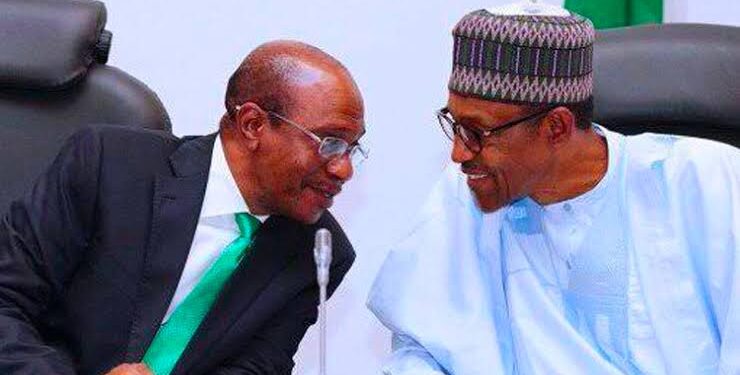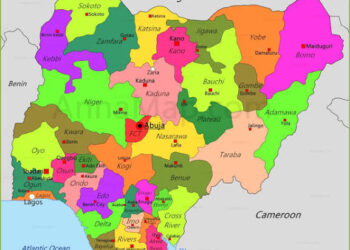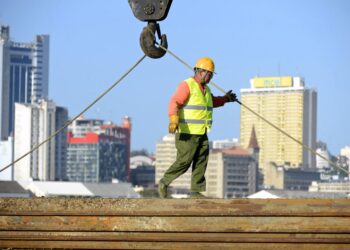*Say After Decades Of Drifting, Giant Still Struggling
By John Danjuma Omachonu
Nigeria is, understandably, the largest economy in Africa, with about 221 million people as at 2023 with a nominal GDP of $500 billion, with huge growth and development prospects for her growing population.
However, years of sub-optimal economic performance and missed opportunities to press the reset button have come to haunt the African Giant.
Also, inept leadership and high level impunity at the level of highly compromised and politicized civil service and as well, among appointed and elected politicians have continued to produce negative economic indicators.
Specifically, the Gross Domestic Product (GDP) has been witnessing sluggish growth of about 3.2 percent in 2022, as against double-digits, when compared with the rate of rapid population.
Inflation is astronomical, currently at 22.22 percent in April from 22.04 percent in the previous month, the highest in 17 years, propelled by rising food prices.
This is despite multiple interest rate hikes by the Central Bank of Nigeria, (CBN in recent time, and happening at a time that prices are falling globally.
The figures which were contained in the statement issued by the nation’s Statistics Bureau (NBS), showed that the core inflation rate stands at 20.14 percent in April 2023.
This is compounded with the continuing depreciation of the naira whose value is coming second to none amid rising unemployment and multidimensional poverty of over 100 million Nigerians.
For instance, the Federal Government of Nigeria, through the NBS last year launched the results of the 2022 Multidimensional Poverty Index (MPI) Survey.
The survey was a collaborative effort between NBS, the National Social Safety-Nets Coordinating Office (NASSCO), the United Nations Development Programme (UNDP), the United Nations Children’s Fund (UNICEF), and the Oxford Poverty and Human Development Initiative (OPHI).
The survey, which sampled over 56,000 households across the 36 states of the Federation and the FCT, was conducted between November 2021 and February 2022, and provides multidimensional poverty estimates at senatorial district level.
Highlights of the 2022 Multidimensional Poverty Index survey reveal that 63% of persons living within Nigeria (133 million people) are multidimensionally poor.
More worrisome is the fact that the federal government says it has spent billions of naira trying to lift Nigerian out of poverty while the Central Bank of Nigeria (CBN) has spent similar billions in its direct involvement in agriculture, through the Anchor Borrowers Program and other programs that some analysts say, ther impacts are yet to be felt.
It is on records that rising food prices have been instrumental to the growing inflationary pressures, while multiplicity of exchange rates and subsidy on foreign exchange have continued to impoverished Nigerians, whose only available source is the black market.
The debt profile is mind boggling with some analysts saying that, when the recent securitization of CBN’s Ways and Means of about N22.7 trillion is added, the debt profile might move to N77 trillion and possibly N80 trillion at the end of the year, since the propensity to borrow even by the outgoing administration has not waned.
In fact, others are speculating that with external debt to export ratio at 64.9%, it’s signaling an impending debt service crunch, and there are too many uncertainties and worsening volatility in the oil markets.
According to Bismarck Rewane, “In terms of solving the underlying economic defects, how fast and far policymakers can go is constrained because of low revenues. More so, there’s only so much fiscal policy authorities can do in sensitive times such as we have today. What this means is that for the government to do its job of keeping the pulse of Nigeria strong, it will have to woo investors. And this begins with monetary and fiscal policy harmonization.”
The development made Rewane and the FDC Think Tank to ask in the current edition of the LBS Breakfast session, ‘What is Nigeria’s economic destination under the new dispensation?
The foremost economist may have been compelled to ask such question because according to him, “From the pepper seller at Jalingo market to the security guard at the Wema Bank branch and the CEOs of top companies, everyone is pessimistic, yet curious about the future of Nigeria.
In proffering solution, he made an analogy to Ruchir Sharma, in his book “Breakout Nations: In pursuit of the Next Economic Miracles”, and subsequently made these two comments:
“After a decade of rapid growth, the world’s most celebrated emerging markets are poised to slow down. Which countries will rise to challenge them?”
“To identify the economic stars of the future we should abandon the habit of extrapolating from the recent past and lumping wildly diverse countries together. We need to remember that sustained economic success is a rare phenomenon”
The economist and his Think Tank noted that these statements made them to have presented three possibilities for “Africa’s giant”: a tiger nation, a banana republic or the worst of all, a cassava republic (failed state).
According to him, present circumstances have forced the analysts to ask whether Nigeria will have “a good comeback story, tagged as an economic miracle like the Asian Tigers (South Korea, Singapore, Taiwan & Hong Kong) or will we take minuscule strides to maintaining our emerging market title like the BRICS (Brazil, Russia, India, China & South Africa) or will we fall to the bottom of the pyramid, becoming a pariah state notorious for narcotics, political instability and insurgency like Afghanistan and Iraq?”
He further noted that with the benefit of hindsight and using the “lens of the last eight years and the unfortunate events at the presidential elections, the outlook for Nigeria looks tough. But as they say “when the going gets tough, the tough gets going.”
However, he was quick to posit that the outcome for Nigeria (Tiger, Banana or Cassava) heavily depends on the ability of the incoming administration to take audacious steps towards institutionalizing the much needed reforms.
Consequently, he said the next set of policy makers have their work cut out for them and the first step is signaling with the aim of boosting investor and business confidence.
The Nigerian government, according to him is too cash-strapped to revive the economy alone, stressing, “Nigeria needs all the help it can get.”
He said, “From our little crystal ball, our verdict is that Nigeria will have to either adapt or perish in the coming days. In other words, It’s crunch time for Nigeria (make or break).”
Commenting further in the FDC Economic Bulletin of last week’s edition, he advised policymakers who determine the direction of the economy, boldly influencing the quality of life of the citizens on the need to be cautious about the level of desperation in reaction to the depth of the problem, adding, “It is important because Nigeria is already on edge; one misstep, and the economy erupts.”
A good starting point according to him, is understanding and solving the underlying structural problems that make the economy weak and stunt its growth prospects.
“What the past three years has shown is that Nigeria’s economy is fragile and highly vulnerable to external shocks, and there’s a huge need for fiscal and monetary policy coordination to boost market confidence,” he sad.
Muda Yusuf Chief Executive Officer, Centre for the Promotion of Private Enterprise said the debt profile of the country as at today is scary, adding that part of the solution lies in the prioritization of policies by the incoming administration with good team to manage economy, adding, the “economic management system should be the one that should not be vulnerable to political patronage.
Yusuf, who featured on the Arise Television’s ‘The Morning Show,’ on May 12, 2023 insisted that subsidy issue should be tackled in phases and should be gradual, possibly after three months of the life of the new administration and with the creation of environment to absorb the shocks.
The analyst who deplored the opaque foreign exchange policy of CBN called for the review of the present practice where government is losing billions of money by subsidizing it at N460/$ at the official market, when the real exchange value is over N700/$ at the black market.
The former director general of the Lagos Chamber of Commerce and Industry, (LCCI) said the debt profile of the country is very scary, particularly with shrinking revenue.
“On the debt profile of the country, it is very scary, The economy is on the brinks, insolvency, almost at the threshold of using all its revenue for debt. N77trillion, and with the securitization of CBN debts might get the country to N80trn by the end of the year. CBN loans to federal government still in secrecy even up to N23trillion. Fiscal operations of government need a second look or else we will end up with IMF loan,” he said
On the fresh request for $800m World Bank loan, Yusuf said it is difficult to justify considering few days to end of administration, stressing that the Buhari administration should concentrate on preparing the handover notes rather than thinking of fresh loans.
Also, he said the outgoing administration should stay off and allow the incoming administration to as well deal with the issue of subsidy removal.
According to him, there is need for a strategy and framework before embarking on the removal adding that during the regime of the late Head of State, General Sani Abacha and president Goodluck Jonathan, the country witnessed creation of Petroleum Trust Fund, where the saved funds was channeled for development for which Buhari was the chairman, as well as the Sure-P as vehicle for development, respectively.
Yususf also deplored lack of transparency and accountability on the part of CBN as could be seen from its balance sheet. According to him, there is no information on its audited accounts for the last three years adding, “There is need for transparency as the bank seems to be carrying its autonomy too far. There is lack of financial disclosure, NNPC seems a little bit open and transparent in its operations particularly with recent developments. However, many loose ends in subsidy operations should be tightened. For instance, the monopoly of NNPC as the sole importer of fuel should be reviewed. No full clearance and understanding on production, consumption of daily fuel in a country that oridesbitsels as an oil producer, etc. Remove subsidy for accountability of operations of NNPC. Inherent contradictions by CBN pumping money and claiming to be going back to withdraw it does not augur well for the economy, particularly with the ensuing inflationary pressures.
Kyari Abba Bukar, an analyst and investment expert said the nation is heavily indebted and despite justification by government officials that the 35% to GDP ratio is sustainable, it is, however, in its percentage to revenue that is of importance to the country’s survival.
Bukar, who featured on Channels Television program’s Politics Today of May 12, noted that despite the over 21billion dollars borrowed as loans in the last eight years, yet, the living condition of the people has not improved but rather going down.
He also deplored the $800 million request,addng that the issue has been the judicious use of the previous loans, asking, “Why borrow from outside to share and why not local borrowing.
Inflation will still continue to rise, say, up to 30 percent. 10 million projected beneficiaries from the loans is too small for a population of over 200million.”
ALSO READ:Special Report: Inside Nigeria’s Power Ministry Of ‘Monumental Frauds’
However, Senate spokesman, Ajibola Bashiru, while defending the executive and also legislature, particularly, ninth National Assemby that is being tagged ‘rubber stamp’ said the argument of an outgoing administration not entering into fresh negotiations like loans, amount to ‘begging the question.’
Bashiru further argued that, beside the same party succeeding itself, any government in power has the consttutional responsibility to enter into any fresh negotiations until the last day in office, adding, “This admnstration has the constitutional madate to issue policies and enter into any agreement until May 29, 2023.”
Justifying the much criticised CBN’s Ways and Means to the Federal Government, which have exceeded the limit stipulated by the bank’s Act, Bashiru advised Nigerians not to focus on the figures, but uses to which the loans were put.
“One could imagine the implication on the economy on senate’s refusal to grant the securitization request of the CBN’s N22.7 trillion ways and means by the executive. The issue is not just reeling out the figures but to what uses are these funds been deployed, adding that the development, such as infrastructure is there for all to see.”
However, MBN gathered that the World Bank has insisted that discussions on the disbursement of the controversial $800 million to Nigeria can only happen under the incoming administration.













